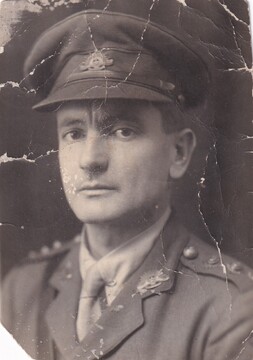SPARROW, Harold James
| Service Number: | 468 |
|---|---|
| Enlisted: | Not yet discovered |
| Last Rank: | Captain |
| Last Unit: | 22nd Infantry Battalion |
| Born: | Not yet discovered |
| Home Town: | Not yet discovered |
| Schooling: | Not yet discovered |
| Occupation: | Teacher |
| Memorials: |
World War 1 Service
| 10 May 1915: | Involvement Sergeant, 468, 22nd Infantry Battalion, --- :embarkation_roll: roll_number: '14' embarkation_place: Melbourne embarkation_ship: HMAT Ulysses embarkation_ship_number: A38 public_note: '' | |
|---|---|---|
| 10 May 1915: | Embarked Sergeant, 468, 22nd Infantry Battalion, HMAT Ulysses, Melbourne | |
| 6 Jun 1917: | Promoted AIF WW1, Captain, Sgt Harold James Sparrow was commissioned to Second Lieutenant at Gallipoli, October 1915, after serving as Sgt, Q.M Sgt, Company-Sgt-Major and Reg Sgt Major. He gained his second star (Lieutenant) in 1916 and was made Captain on the 6th June 1917 due to Bullecourt losses. |
Help us honour Harold James Sparrow's service by contributing information, stories, and images so that they can be preserved for future generations.
Add my storyBiography contributed by Chris Hogan
Captain Harold Sparrow died in 1960-- we remember him as a warm & educated man, with a love of learning, literature & writing, a wry sense of humor & a sense of adventure.
In a paradox often seen in soldiers, he would never talk about the war in any real detail but preserved 3 powerful mementoes still in the family's possession namely- the riding boots from the Light Horse militia unit he belonged to in Gippsland before the war (sadly , these were lost) a Turkish bayonet from Gallipoli & a handwritten letter of condolence from King George 111 when he was recovering in an English hospital from appendicitis.
When pressed he would say he remember Gallipoli for the heat, the dust, the stench & the flies. He hated flies & no fly at all was tolerated in his house. He had a special collection of 5 fly swatters- one with an extended handle. When the pump packs of Mortein fly spray became available, he described it as a feeling next to ecstasy .
I asked him why he was promoted, he replied that it was because every other officer died.
He & his wife, Elizabeth were unable to have liveborn children - they attributed this to Harold's having been significantly exposed to Mustard Gas < derivatives of this are now a form of anticancer chemotherapy> in the French trenches in WW1.
They met when he was a teacher in Tongio near Omeo; Lizzie was a member of the Johnston family which ran Tongio Station a large sheep station (or ranch) in the Victorian High Country.
Harold joined his brother-in-law Eric Boardman in running the paper which was to become "The Regional "in Sunbury & was quite a local identity still remembered by those old enough to have met him.
In his semi-retirement he edited the Lancefield & Romsey newspapers "The Mercury" & "The Examiner". Finally, he & Lizzie moved to be with her sister in Murrumbeena where he died in 1960.
Lizzie was a favorite of all the children of her extended family with the ability to talk to them honestly, openly & tactfully about even the most difficult of topics without embarrassment. She died peacefully many years later on a trip to Bairnsdale Gippsland. Both were cremated & buried in the Dandenong Cemetery but no grave marker remains











